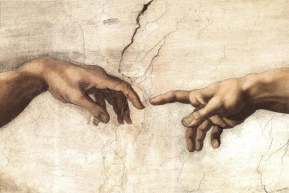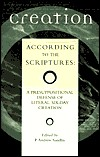GENESIS 2 EXPOSITION (1)
PMW 2024-024 by Kenneth L. Gentry, Jr.
 Once again I will offer a running overview of an important passage of Scripture. This two part series will present the creation of Adam, the planting of Eden, and the marriage of man.
Once again I will offer a running overview of an important passage of Scripture. This two part series will present the creation of Adam, the planting of Eden, and the marriage of man.
Gen. 2:7a
the LORD God formed
This shows the intensely personal creation of man. Animals were created en masse by a spoken word (1:20, 24); man was created as an individual by God’s carefully forming his body and in-breathing life into him (cp. 2:21–22). This is not a poetic, anthropomorphic image of a potter at work, for: (1) neither the word “potter” nor “hand” appear (as in Jer. 18:4, 6) and (2) potters do not work with “dust” but clay (Isa. 29:16; Jer. 18:4).
Gen. 2:7b
man
The Hebrew word for “man” is adam which is related to the word “ground” (adamah). As a land creature man is closely linked with the ground from the beginning (2:5, 9, 15–16; 3:16–19a; cp. 1:29). Under God’s curse for his rebellion, he will return to the ground (3:19b).
Gen. 2:8a
God planted a garden
God creates man in a perfect environment: a well-stocked garden (cf. v. 9). This will be man’s testing ground as a moral creature in God’s image (cf. vv. 16–17). God lovingly creates and cares for man, unlike the terrifying gods of Canaan (e.g., Lev. 18:21).
Gen. 2:8b
Eden
The uncertain word “Eden” may mean “luxurious pleasure,” signifying the wonderful setting. Here Eden speaks of the larger region in which the “garden” is planted: “God planted a garden toward the east, in Eden” (cp. v. 10a). In this perfect setting, God places two special trees in the very center of the garden for emphasis. Very little is said about them, with the tree of knowledge never mentioned again in the Bible after Genesis 3. We can, however, surmise a little from their names and the results of eating from them.

As It Is Written: The Genesis Account Literal or Literary?
Book by Ken Gentry
Presents the exegetical evidence for Six-day Creation and against the Framework Hypothesis. Strong presentation and rebuttal to the Framework Hypothesis, while demonstrating and defending the Six-day Creation interpretation.
See more study materials at: www.KennethGentry.com
Gen. 2:9a
the tree of life
Since Adam is already alive (v. 7), has many trees for food (v. 9; cp. 1:29), and is later forbidden access to the “tree of life” (3:24), this tree is not essential to sustaining life on a daily basis. Rather, it is related to gaining eternal life (Gen. 3:22; cp. Rev. 22:14). Apparently, God will grant free access to it after Adam passes a period of moral probation under this “covenant of works.” Unfallen man is under moral obligation to God after which he will earn access to the tree granting him eternal life. It is not a magical tree, which physically grants life, but a tree appointed by God to function like a sacrament or ordinance (such as baptism or the Lord’s Supper) signifying man’s confirmation for securing eternal life (cp. Rev. 2:7; 22:2).
This verse presents what theologians call the “covenant of works.” It is the covenant established by God with Adam before his fall into sin. In it God gives Adam a glorious garden and condition (2:8–9, 15, 18–24), but with a warning that disobedience will result in covenant cursing and death (vv. 16–17). The narrative in this section (beginning at 2:4) leads tragically to Adam’s disobedience and God’s curse (ch. 3). Adam broke God’s covenant (Hos. 6:7) and brought sin and death into the world (Rom. 5:12–19; 1 Cor. 15:22). The covenant of grace will replace this covenant when God reaches out to Adam in mercy and love offering him salvation by grace (cf. 3:15).
Gen. 2:9b
the tree of the knowledge of good and evil
This is the tree of moral testing within the covenant of works. Had Adam obeyed God’s command and avoided this tree (2:17), he would have eventually passed his probation and merited eternal life. He would thereby be granted access to the tree of life, which would confirm his eternal acceptance with God (3:22). This was not a magical tree that miraculously imparted knowledge. Rather it was a testing tree to see if man would let God be God, determining good and evil (by forbidding this tree as a test case). Instead, Adam himself sought to “be as God” autonomously determining right and wrong (3:5).
Gen. 2:10–14
four rivers
One river flowed through Eden then parted into four rivers. The garden was well-watered (vv. 6, 10–14; cp. 13:10), despite the lack of rain on the sixth day (v. 5). This passage does not report erroneous information simply because we do not see a common source to the Tigris and Euphrates today. We should understand that Noah’s later world-covering Flood (Gen. 7:19–20; Luke 17:26–27; 2 Pet. 3:5–6) must have radically altered earth’s topography. The Euphrates and Tigris are well-known rivers in the Bible (Gen. 15:18; Deut. 1:7; Dan. 10:4) and today. But apparently their names were re-used after the Flood in remembrance of this former estate.
When Noah disembarked the Ark he would surely have named places and rivers after earlier places he had known in the pre-Flood world. Why would he create all new names for everything? Similarly, today America has a river in New London, Connecticut, called the River Thames. This was obviously named after the famed river in England. Likewise, the River Trent in North Carolina was named after the river in England.
Geologists recognize that during the Indus period, the Sarasvati was a large river fed by the Sutledge and Yamuna rivers. But over time tectonic movements separated the Yamuna from the Indus system of rivers, eventually causing it to become smaller and fade away. The Amazon River once flowed, at least for a time, in the opposite direction than currently due to tectonic uplift.
 Creation according to the Scriptures
Creation according to the Scriptures
Ed. by P. Andrew Sandlin
This book is sub-titled: A Presuppositional Defense of Literal , Six-day Creation. It has chapters by R. J. Rushdoony, Andrew Sandlin, Kenneth Gentry, Cornelius Van Til, and others. It touches on historical, exegetical, theological, and philosophical implications of Six-day Creation.
See more study materials at: www.KennethGentry.com
Gen. 2:15
to cultivate it and keep it
God created man for fulfilling labor (1:26–28), not for lazy idleness. Work is a creation ordinance and is highly esteemed in the biblical worldview (Prov. 6:6–9; 19:15; 2 Thess. 3:10), being rooted in the very origin, meaning, and purpose of man here. Adam was called to subdue the whole earth, but he begins this in a small area, the garden in Eden. This is the first appearance of the principle of gradualism in Scripture (cp. Deut. 7:22; Isa. 28:10, 13). An ongoing principle of Scripture is here assumed: man is not to expect instant gratification.
To be continued….
Kenneth L. Gentry Jr.'s Blog
- Kenneth L. Gentry Jr.'s profile
- 85 followers



